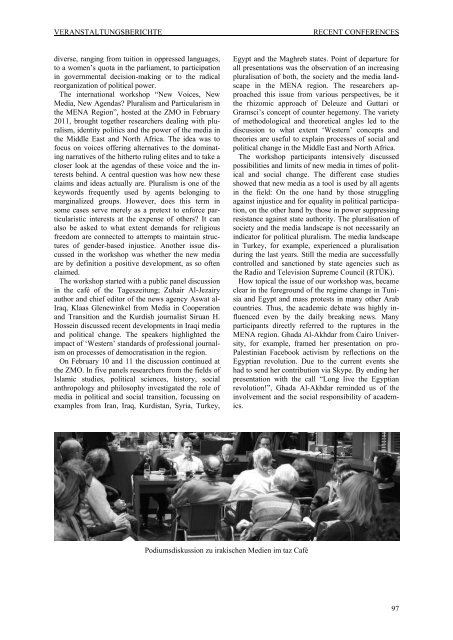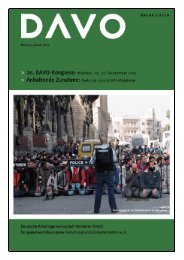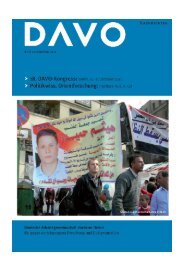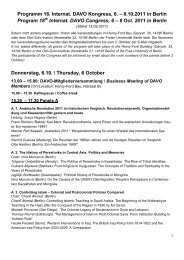4 Dissertationen und Habilita- tionen / Dissertations and Habilitations
4 Dissertationen und Habilita- tionen / Dissertations and Habilitations
4 Dissertationen und Habilita- tionen / Dissertations and Habilitations
Erfolgreiche ePaper selbst erstellen
Machen Sie aus Ihren PDF Publikationen ein blätterbares Flipbook mit unserer einzigartigen Google optimierten e-Paper Software.
VERANSTALTUNGSBERICHTE RECENT CONFERENCES<br />
diverse, ranging from tuition in oppressed languages,<br />
to a women’s quota in the parliament, to participation<br />
in governmental decision-making or to the radical<br />
reorganization of political power.<br />
The international workshop “New Voices, New<br />
Media, New Agendas? Pluralism <strong>and</strong> Particularism in<br />
the MENA Region”, hosted at the ZMO in February<br />
2011, brought together researchers dealing with pluralism,<br />
identity politics <strong>and</strong> the power of the media in<br />
the Middle East <strong>and</strong> North Africa. The idea was to<br />
focus on voices offering alternatives to the dominating<br />
narratives of the hitherto ruling elites <strong>and</strong> to take a<br />
closer look at the agendas of these voice <strong>and</strong> the interests<br />
behind. A central question was how new these<br />
claims <strong>and</strong> ideas actually are. Pluralism is one of the<br />
keywords frequently used by agents belonging to<br />
marginalized groups. However, does this term in<br />
some cases serve merely as a pretext to enforce particularistic<br />
interests at the expense of others? It can<br />
also be asked to what extent dem<strong>and</strong>s for religious<br />
freedom are connected to attempts to maintain structures<br />
of gender-based injustice. Another issue discussed<br />
in the workshop was whether the new media<br />
are by definition a positive development, as so often<br />
claimed.<br />
The workshop started with a public panel discussion<br />
in the café of the Tageszeitung; Zuhair Al-Jezairy<br />
author <strong>and</strong> chief editor of the news agency Aswat al-<br />
Iraq, Klaas Glenewinkel from Media in Cooperation<br />
<strong>and</strong> Transition <strong>and</strong> the Kurdish journalist Siruan H.<br />
Hossein discussed recent developments in Iraqi media<br />
<strong>and</strong> political change. The speakers highlighted the<br />
impact of ‘Western’ st<strong>and</strong>ards of professional journalism<br />
on processes of democratisation in the region.<br />
On February 10 <strong>and</strong> 11 the discussion continued at<br />
the ZMO. In five panels researchers from the fields of<br />
Islamic studies, political sciences, history, social<br />
anthropology <strong>and</strong> philosophy investigated the role of<br />
media in political <strong>and</strong> social transition, focussing on<br />
examples from Iran, Iraq, Kurdistan, Syria, Turkey,<br />
Podiumsdiskussion zu irakischen Medien im taz Café<br />
Egypt <strong>and</strong> the Maghreb states. Point of departure for<br />
all presentations was the observation of an increasing<br />
pluralisation of both, the society <strong>and</strong> the media l<strong>and</strong>scape<br />
in the MENA region. The researchers approached<br />
this issue from various perspectives, be it<br />
the rhizomic approach of Deleuze <strong>and</strong> Guttari or<br />
Gramsci’s concept of counter hegemony. The variety<br />
of methodological <strong>and</strong> theoretical angles led to the<br />
discussion to what extent ‘Western’ concepts <strong>and</strong><br />
theories are useful to explain processes of social <strong>and</strong><br />
political change in the Middle East <strong>and</strong> North Africa.<br />
The workshop participants intensively discussed<br />
possibilities <strong>and</strong> limits of new media in times of political<br />
<strong>and</strong> social change. The different case studies<br />
showed that new media as a tool is used by all agents<br />
in the field: On the one h<strong>and</strong> by those struggling<br />
against injustice <strong>and</strong> for equality in political participation,<br />
on the other h<strong>and</strong> by those in power suppressing<br />
resistance against state authority. The pluralisation of<br />
society <strong>and</strong> the media l<strong>and</strong>scape is not necessarily an<br />
indicator for political pluralism. The media l<strong>and</strong>scape<br />
in Turkey, for example, experienced a pluralisation<br />
during the last years. Still the media are successfully<br />
controlled <strong>and</strong> sanctioned by state agencies such as<br />
the Radio <strong>and</strong> Television Supreme Council (RTÜK).<br />
How topical the issue of our workshop was, became<br />
clear in the foregro<strong>und</strong> of the regime change in Tunisia<br />
<strong>and</strong> Egypt <strong>and</strong> mass protests in many other Arab<br />
countries. Thus, the academic debate was highly influenced<br />
even by the daily breaking news. Many<br />
participants directly referred to the ruptures in the<br />
MENA region. Ghada Al-Akhdar from Cairo University,<br />
for example, framed her presentation on pro-<br />
Palestinian Facebook activism by reflections on the<br />
Egyptian revolution. Due to the current events she<br />
had to send her contribution via Skype. By ending her<br />
presentation with the call “Long live the Egyptian<br />
revolution!”, Ghada Al-Akhdar reminded us of the<br />
involvement <strong>and</strong> the social responsibility of academics.<br />
97





